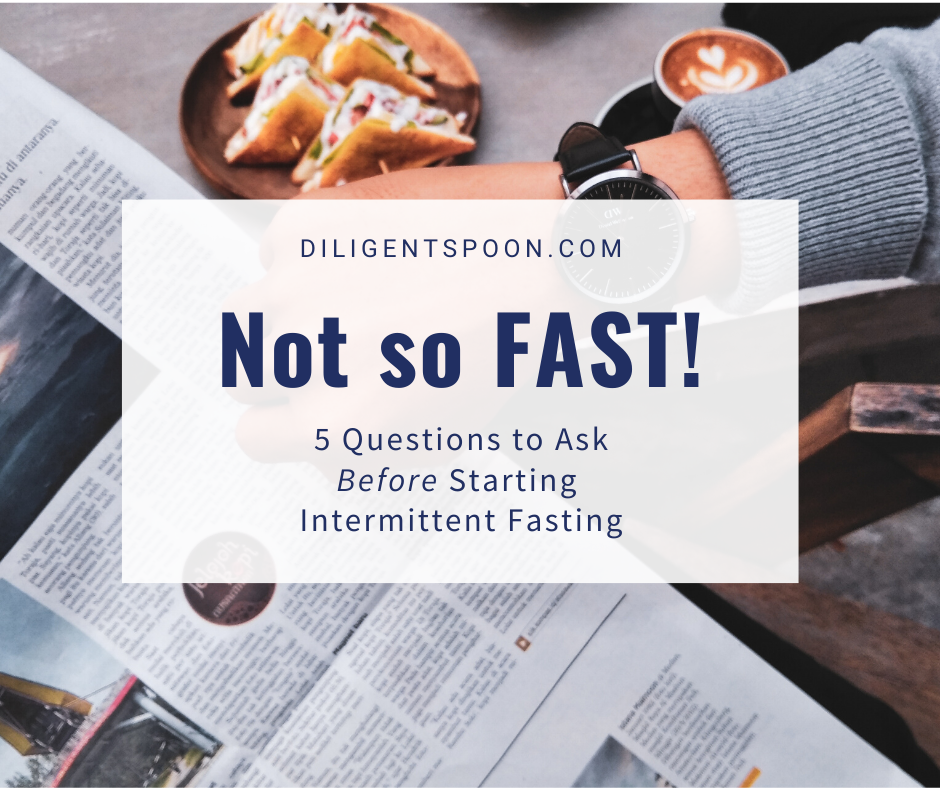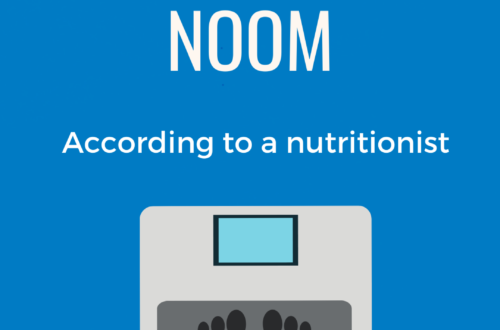
5 Questions to Ask Yourself Before Intermittent Fasting
Weight loss is difficult – could intermittent fasting (IF) be the answer? This eating pattern – that defines WHEN, not WHAT , you eat – has actually proven to help people lose weight. At least, in the short-term.
IF is Different Than Other Diets
With IF, you can eat anything you want – that’s the primary difference between it and regular diets. There’s no “food rules” or supplements to buy, you don’t have to eat lots of kale or drink mystery diet elixirs.
Sounds easy, right? Well … what makes IF effective is that you cycle between regular periods of eating and not eating. And, the non-eating timeframes can be anywhere from 16 hours to 24 hours or more. *Gulp.*
If you’re curious about some of the most popular IF plans, I’ve outlined a few in Intermittent Fasting: 101.
IF is Good for Weight Loss, But …
Actual research studies have shown that IF is a successful way to lose weight, and it may have some health benefits. However, for certain groups of people, IF can can be detrimental.
Before beginning IF for weight loss, it’s important to know if it’s right for you. In other words, do the benefits outweigh the drawbacks? Here are five questions I would ask myself before starting an intermittent fasting program.
1. Am I Willing to Not Eat When I’m Hungry?
IF requires that you eat by the clock. This can lead to second-guessing the needs of your body or all-out ignoring hunger cues. Which is all fine and good until something goes wrong …
- Primal hunger. Also known as “hanger”. When you’re so hungry that your head hurts, and anyone who stands between you and the chicken fingers will lose an actual finger. If you get this hungry, you may stop caring what the clock says and just decide … nom-nom-nom-nom-nom!
- Social engagements outside of planned “eating hours”. For example, we have friends who rarely eat dinner before 8pm (Yikes – almost bedtime!). If I’m fasting, does that mean that I can’t enjoy dinner with my friends?
- Unpleasant side effects of IF: persistent hunger (duh), cold, irritability, low energy, distraction and lower work performance. These are from research – not just my opinion.
As with any restriction diet, you will likely gain weight if you stop IF. So, the big question here is:
Are you willing to practice intermittent fast long-term? As in, years?
2. Ladies: Am I Trying to Get Pregnant, Currently Pregnant, or Breastfeeding?
Growing a baby is a pretty freakin’ amazing physical feat, and it takes a lot of energy.
Know this: Your body is very good at keeping you alive. It will absolutely stop “non-essential” functions to survive.
- If you’re trying to get pregnant while also fasting, your body may believe that there won’t be enough energy and nutrients to grow a baby. In response, it will reduce “baby-making” hormones (eg, stop your periods) until it feels like there will be enough food to resume.
- If you are pregnant and fasting, again, the body will preserve mom’s health at the expense of a growing baby. The most common risks are low birth weight, less fetal movement, and infant anemia (due to low maternal iron during pregnancy).
- Lastly, if you’re breastfeeding, please do not try intermittent fasting (unless you want to stop breastfeeding). Like a broken record … if your body feels starved, it will stop doing things that take extra energy. Like producing enough milk for a growing baby.
3. Am I a Serious Athlete?
Ok, I’m just going to say that this should be obvious. I know that there are “professionals” out there that will argue that IF burns fat and preserves muscle, but hear me out:
Your muscles’ most favorite fuel in the whole wide world is glucose. It’s like high-octane gasoline is to a finely-tuned sports car. When you fast, you run out of glucose (best fuel) and your body has to re-organize other molecules (fat, muscle protein – yes, MUSCLE) into glucose. So, when you work out with no glucose available, you have to work harder (remember – body working overtime just to make glucose from other stuff) to get the same performance.
Long-story-short: If you’re a recreational athlete and exercise just for fun, IF is probably A-OK. And, you’re a normal person.
If you’re serious about getting a personal record in a half-marathon or competing in a crossfit competition … IF will not help you do that.
4. Do I Have a History of Disordered Eating?
If you answered “Yes” to this, DO NOT do IF. That’s all.
Again, I think this is pretty obvious. If you have food issues – whether it’s restricting, binging, purging, or just obsessing about it – IF is not for you. It is triggering as all get out. Without going into the details, if this applies to you, you know what I’m talking about.
5. Do I Have a Medical Condition that Makes Fasting Risky?
If you have diabetes (Type 1 or 2) and are dependent on insulin and taking glucose-lowering medications, think twice about starting an IF plan. IF may not be safe for someone who is already at risk for low blood sugar (hypoglycemia).
I’ll also throw in autoimmune disorders that strongly impact diet, like Celiac and Crohn’s Disease. If you are successfully managing either of these – congratulations! You’re awesome. I doubt you want to think about your diet anymore, so go on and do other stuff and forget you ever heard about “intermittent fasting”.
Can You Safely Try Intermittent Fasting?
What I just wrote is not meant to scare you into never missing a meal or refusing to do religious fasts.
The point is that some life situations are not compatible with long-term intermittent fasting as a way to lose weight.
If you answer “Yes” to #1 and “No” to the rest of the questions, go ahead – and PLEASE let me know how it goes.
As for me, I choose to eat ad libitum (latin for “in accordance with one’s wishes), a fancy way of saying “whenever I’m hungry”. I am a woman of child-bearing age, an athlete, and have a history of disordered eating. So … am I biased against IF? No, I just know it’s not for me.
Is IF for you? If so, let me know in the comments! I’d love to hear about your experience. 🙂
References
Gleeson, Jane Racey. “Intermittent Fasting: Is It Right for You?” Health & Wellness Topics, Health Tips & Disease Prevention, 29 July 2019, healthblog.uofmhealth.org/wellness-prevention/intermittent-fasting-it-right-for-you.
“Intermittent Fasting: Live ‘Fast,’ Live Longer?” ScienceDaily, ScienceDaily, 26 Dec. 2019, www.sciencedaily.com/releases/2019/12/191226084351.htm.
Marcin, Ashley. “Is Intermittent Fasting While Pregnant Safe and Healthy?” Healthline, Healthline Media, 22 Oct. 2019, www.healthline.com/health/pregnancy/intermittent-fasting-while-pregnant.
“Preferred Diets. Fieldwork Dates: 3rd – 6th January 2020, US_nat_int Sample: 3rd – 6th January 2020.” YouGov plc 2020.
Rinaldi, Nicola J., et al. No Period. Now What?: a Guide to Regaining Your Cycles and Improving Your Fertility. Antica Press, 2016.
Trepanowski, John F., et al. “Effect of Alternate-Day Fasting on Weight Loss, Weight Maintenance, and Cardioprotection Among Metabolically Healthy Obese Adults.” JAMA Internal Medicine, vol. 177, no. 7, 2017, p. 930., doi:10.1001/jamainternmed.2017.0936.
Tribole, Evelyn, and Elyse Resch. Intuitive Eating: a Revolutionary Anti-Diet Approach. St. Martin’s Essentials, 2020.
Varady, Krista A, and Marc K Hellerstein. “Alternate-Day Fasting and Chronic Disease Prevention: a Review of Human and Animal Trials.” The American Journal of Clinical Nutrition, vol. 86, no. 1, 2007, pp. 7–13., doi:10.1093/ajcn/86.1.7.
Wolfram, Taylor. “Investigating Intermittent Fasting: Food & Nutrition: From the Magazine.” Food & Nutrition Magazine, 4 Oct. 2018, foodandnutrition.org/from-the-magazine/investigating-intermittent-fasting/.





